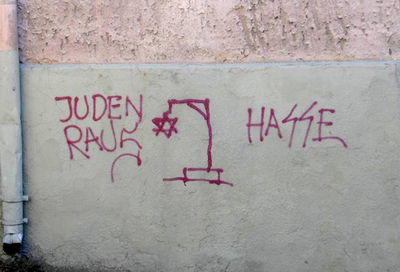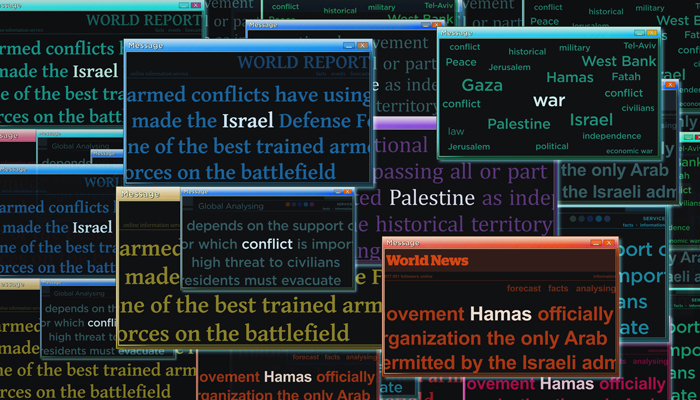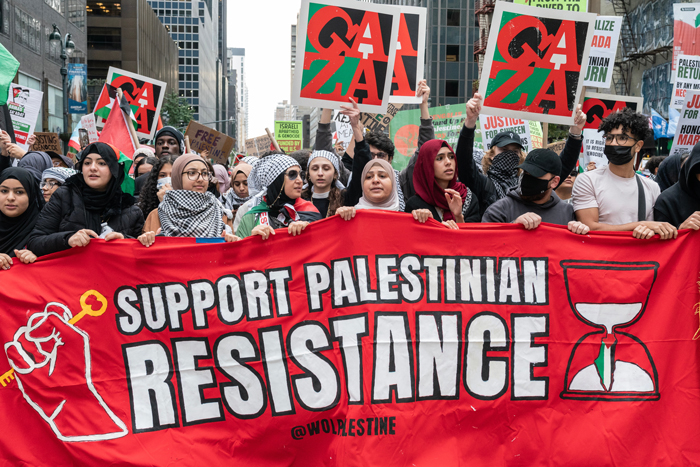 Beny Shlevich, CC BY-SA 2.0, via Wikimedia Commons |
I gave a talk to Holocaust survivors last month. More than one told me that the mood in the UK for Jews now resembles Germany in the 1930s. The difference between them and others claiming this is that they remember it from the first time around.
They are right. This is no longer hyperbole; it is fact.
The Holocaust didn't start with gas chambers. It started with graffiti, slurs, and whispers. It began with people asking Jews to account for themselves. Are you loyal? Are you one of us?
In 2025, that looks like: are you a Zionist?
I heard exactly that question last night over a pint with a friend who had attended a Jewish cultural event. The barman (in the Three Crowns in St James, if you're interested) demanded of my friend, "Are you a Zionist?" The implication was clear that support for the Jewish state now carries a moral price tag. It is a litmus test for belonging, for acceptability. That is not political disagreement; it is a modern shibboleth meant to mark Jews for social exile.
We are witnessing a global rise in antisemitism at a scale not seen for generations. Some of it is overt. It is violent, chilling, and reminiscent of the pogroms Europe once vowed never to repeat. In Amsterdam last year, what was initially dismissed as football hooliganism was later revealed, through text messages and court transcripts, to be a lynching of Jews driven by pure racial hatred. Not "anti-Zionism"; pure Judenhass.
At Glastonbury, the "singer" of British act Bob Vylan, repeating popular blood libels against the Jewish state, stood before tens of thousands and chanted for the death of every soldier in the Israel Defence Forces. Again, I'm not being hyperbolic; it was his literal demand. A call for the wholesale killing of Jewish soldiers, which in practice means calling for the deaths of the sons and daughters of almost every Israeli family. That's not resistance. That's incitement. When crowds cheer that on, we are no longer in the realm of protest. We are in something else entirely.
What begins as words ("Zionist," "settler," "coloniser") becomes real-world violence in short order. The language matters. Words shape permission structures. They signal what is tolerated and what is forbidden. When an artist calls for the death of every IDF soldier, and the crowd cheers, it gives a green light to every unhinged antisemite listening.
This hatred does not exist in a vacuum. It is fed, every day, by an information campaign unlike anything we've seen since the Cold War. Hamas and its allies have mastered the dark art of manipulating digital imagery, fabricating statistics, and weaponising words and emotion. They show the world what war looks like and demand that we call it genocide.
Civilian casualties in Gaza are not the consequence of genocidal intent, but the normal, tragic by-product of every war in history, compounded by the deliberate strategy of a terror regime that uses its own people as human shields. Hamas has stored weapons in schools, fired rockets from refugee camps, and built command tunnels beneath hospitals. Then they cry victim when those military targets are struck. Meanwhile, humanitarian aid is entering Gaza at record levels (on average, double the daily amount compared to before the war began, when there was no accusation of starvation), but activists still scream famine. The truth doesn't matter when the lie is more powerful.
The twisting of words doesn't end with outright lies. The greatest trick Hamas and their allies ever pulled was to conflate Judaism with Zionism. They have made the world believe they are one and the same, then claim that they are "only" against the latter. This sleight of hand has given countless antisemites the perfect semantic shield. "I'm not antisemitic," they say. "I'm just anti-Zionist." Yet their targets are Jewish schools, Jewish homes, Jewish shops, and Jewish friends.
I recently had dinner with a friend who told me that she no longer feels safe in her own social circles and does not wear her Star of David in public. Online, she is inundated with hate, a lifelong Londoner accused of supporting child murder simply for being Jewish. She is far from alone. Jewish students are being harassed on campuses. Mezuzahs are being chiselled off doorposts. Synagogues are being forced to increase security. The Israeli Embassy in London was recently the target of a foiled terror plot. The memorial to the Israeli hostages in Brighton was recently covered in faeces.
This is not about discomfort with Israel's policies. This is about the dehumanisation of an entire race.
I do not believe that most people cheering these slogans or waving these flags are consciously antisemitic. Some will be; now they have a licence to act on long-held prejudices that they no longer feel the need to hide. Many, though, are what Lenin once called useful idiots: fellow travellers swept up in the fervour of a cause they do not fully understand. Others are overwhelmed by propaganda; duped into believing they are standing for justice, when in fact they are being used as foot soldiers in a much darker campaign.
Motivation doesn't matter, though. We are watching words turn to violence in real time. The signs are all there, just as they were in the 1930s. We promised Never Again, but that promise is meaningless if we fail to act when it matters.
We are not yet where Germany was in 1938. However, we are close to where we were in 1933. The slogans, the silences and the scapegoating of Jews are back. Words matter, so let us call it what it is: antisemitism. If we keep showing cowardice on this issue, we will find, all too soon, that the violence is back too. The spiral from slur to slogan to stone is always shorter than we think.
This article was originally published on Substack
 Andrew Fox is a former British Army officer. Recent senior lecturer at the Royal Military Academy Sandhurst. Masters study in Middle Eastern strategy and Psychology. Now a think tank research fellow focusing on Defence, the Middle East and Disinformation. Read more about Andrew on his website. Follow Andrew on Substack
Andrew Fox is a former British Army officer. Recent senior lecturer at the Royal Military Academy Sandhurst. Masters study in Middle Eastern strategy and Psychology. Now a think tank research fellow focusing on Defence, the Middle East and Disinformation. Read more about Andrew on his website. Follow Andrew on Substack



 Why Hamas is an Unreliable Source and How Many Reporters Fail to Disclose This
Why Hamas is an Unreliable Source and How Many Reporters Fail to Disclose This
 Unethical Gaza Reporting Cuts Crucial Context
Unethical Gaza Reporting Cuts Crucial Context
 Stop Calling Them 'Pro-Palestine' Rallies
Stop Calling Them 'Pro-Palestine' Rallies